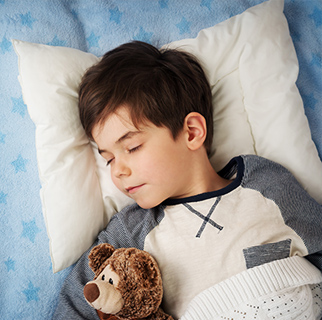Healthy Living
Sleep and Your Child
A good night's sleep is as important to your child as a hearty breakfast. Without enough shut-eye, children are more likely to struggle with their school studies, do poorly on the playing field, and have depression.
According to the National Sleep Foundation, children are getting less than the advised amount of sleep over a 24-hour period.
This can make it tough for your child to solve problems and memorize lessons, which can lower grades and self-esteem. Sleep-starved kids are also more easily frustrated and fidgety. A child's sleep trouble affects the whole family. Parents who are up coaxing a child to bed are robbed of their own valuable sleep.
The best cure is a consistent bedtime schedule. Stick to a bedtime that permits this amount of nightly sleep:
-
10 to 13 hours for a 3- to 5-year-old child. Preschoolers often have difficulty falling asleep and staying asleep. Children this age also are more likely to have nightmares and sleep terrors, and to sleepwalk.
-
9 to 12 hours for a school-age child. Schoolchildren spend time with TVs, computers, tablets, and cellphones, all of which can erode time for sleep. This age group also may be drinking caffeinated beverages that can affect the ease of falling asleep at night. Watching TV just before bedtime may make it more difficult to fall asleep and may create resistance or anxiety about bedtime. Too little sleep can lead to mood swings, and behavioral and cognitive problems.
If the current bedtime for your child is too late, move it 15 minutes earlier each night until you reach the desired bedtime. Tuck resisters back into their own beds, promptly and repeatedly, until they get the message that you expect them to get to sleep on their own.
More sound sleeping advice
-
Unplug the bedroom. Turn off TVs, computers, tablets, and cellphones. Better yet, keep such things out of the bedroom, which should be a stimulation-free zone.
-
Set a wind-down routine. Start the transition to sleep with dimmed lights and a warm bath, and end with reading a book. Don't watch TV just before bedtime.
-
Go decaf. Drinking any caffeine during the day can affect sound sleep. Caffeine is found not just in coffee and cola, but also in tea and chocolate.
-
Reduce daytime stimulation. Overbooked kids who rush from band practice to dance class to dinner to homework may be too keyed up at bedtime to unwind. Experts advise one activity per season.
-
Get help. If, despite these measures, your child still resists bedtime, has nighttime awakenings, or snores, talk with your healthcare provider.
Featured in
Author: Holman, Marcia
© 2000-2025 The StayWell Company, LLC. All rights reserved. This information is not intended as a substitute for professional medical care. Always follow your healthcare professional's instructions.

